Charles E W Bean, Diaries, AWM38 3DRL 606/245/1 - 1915 - 1925 - Part 14
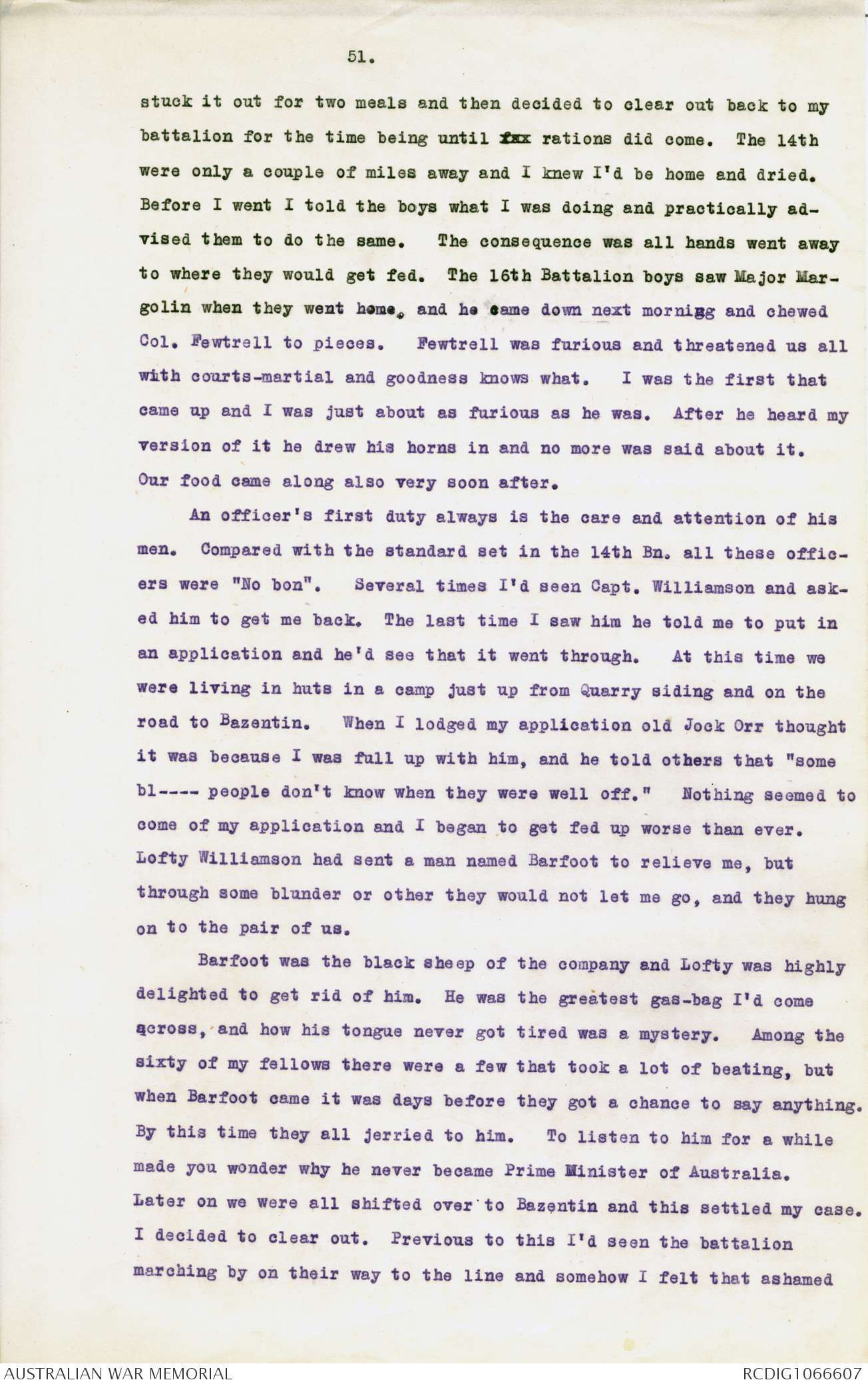
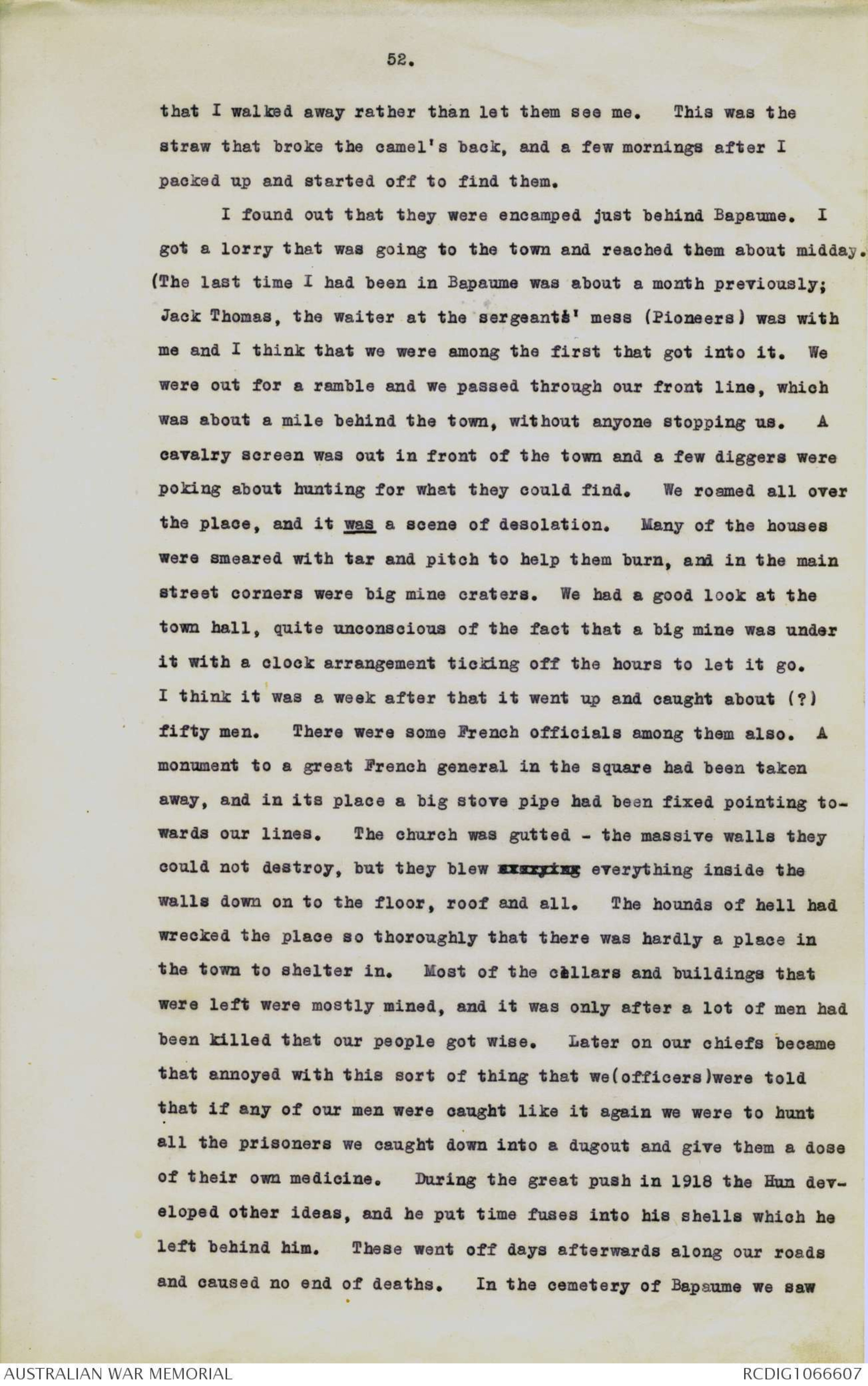
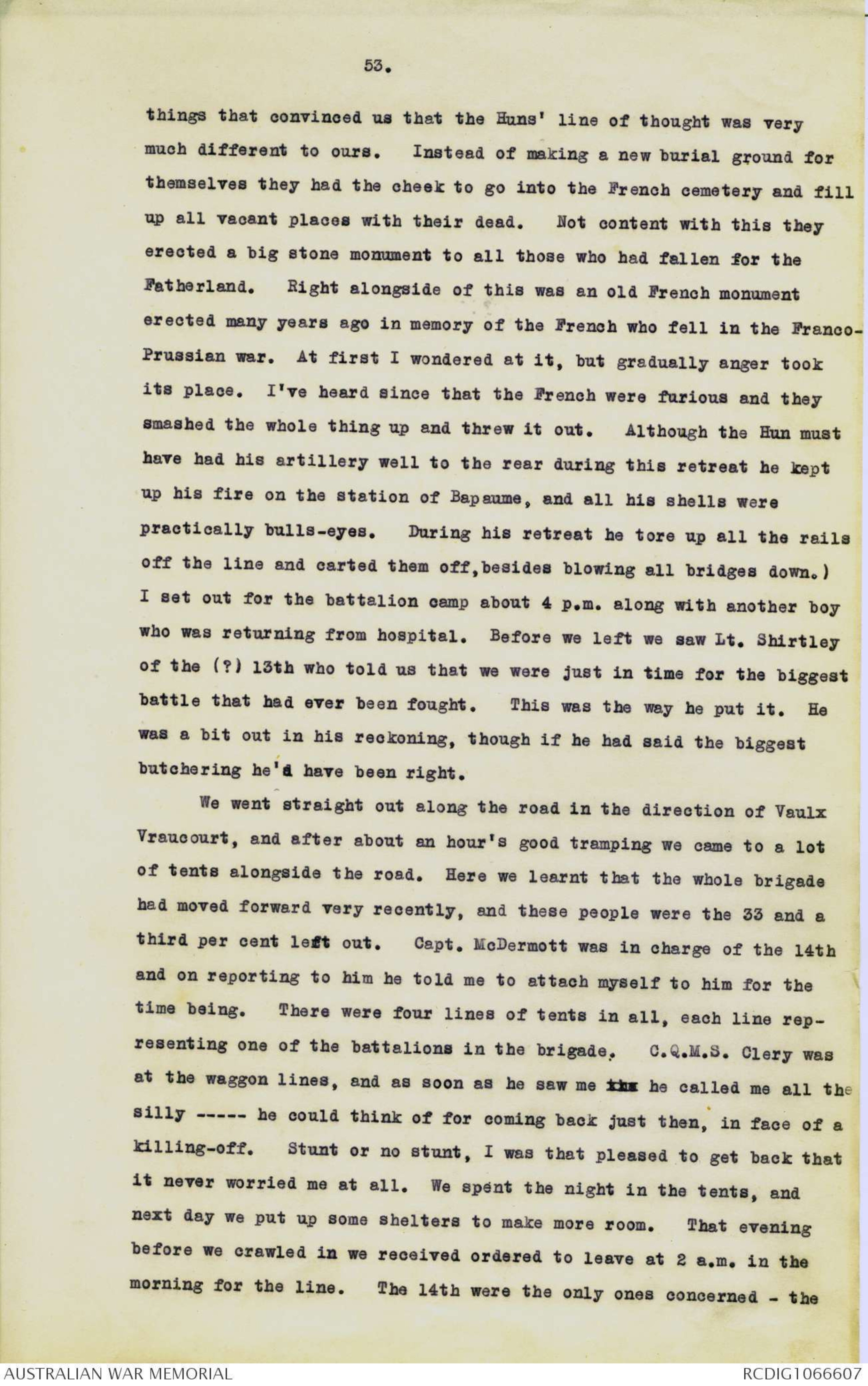
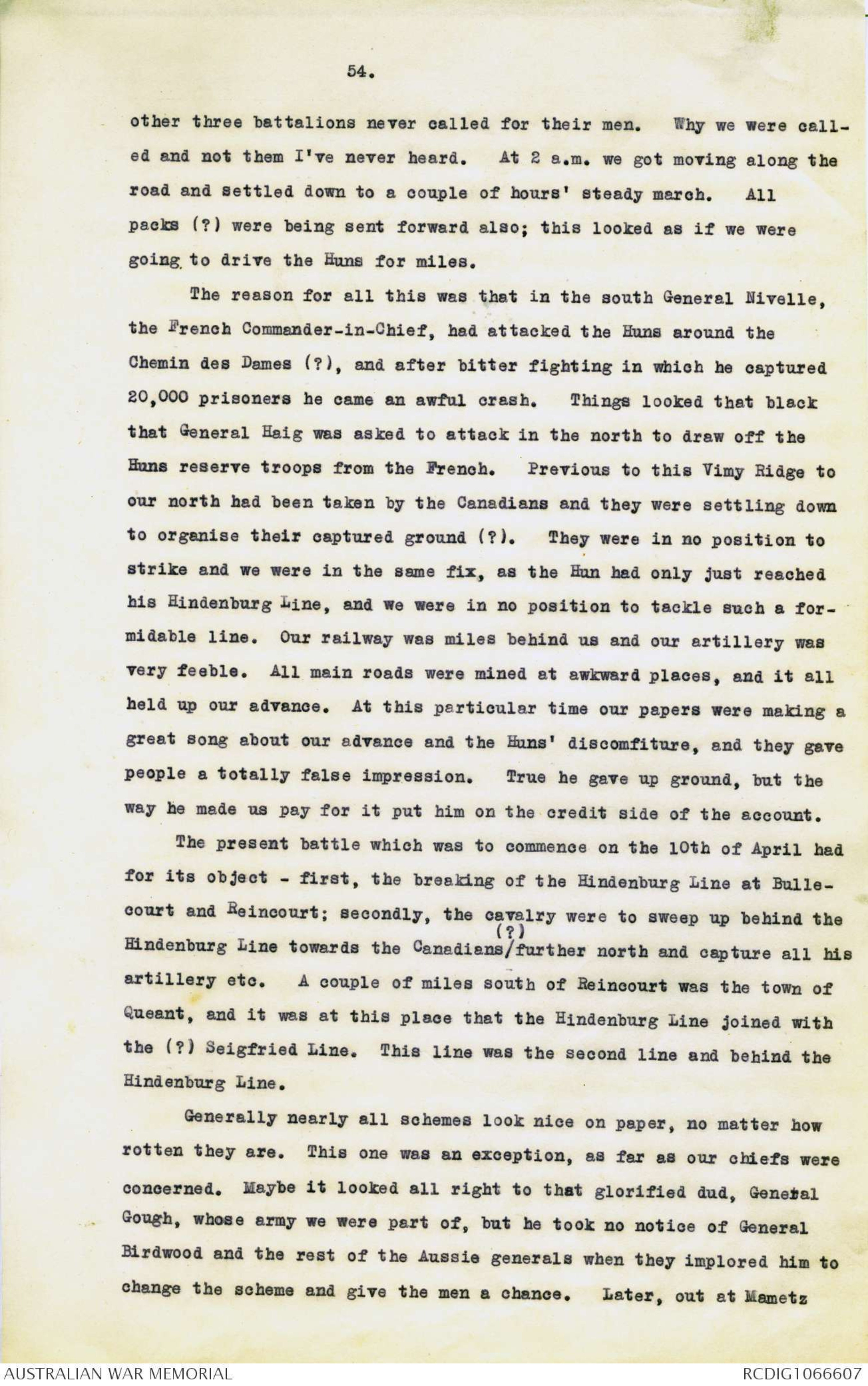
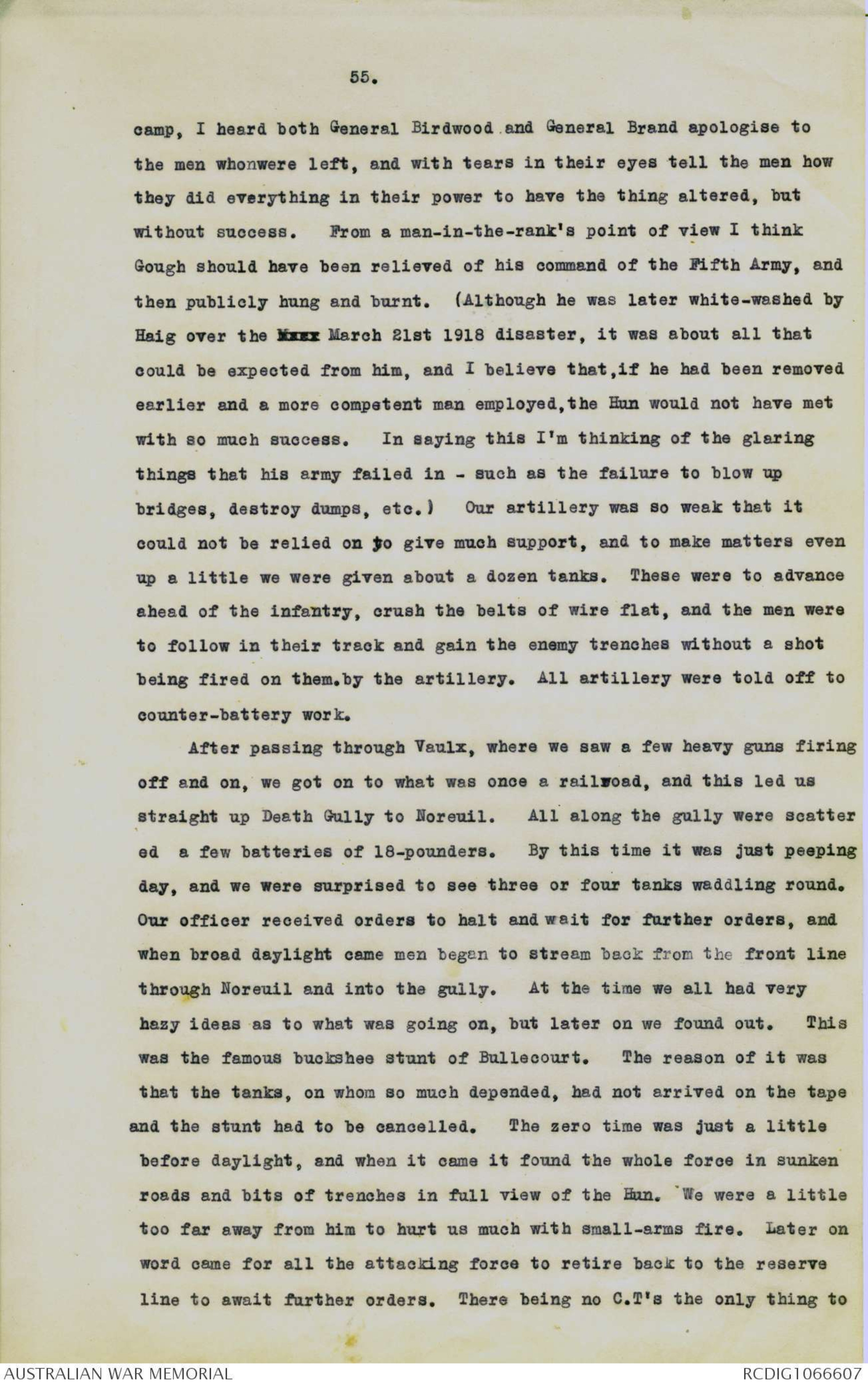
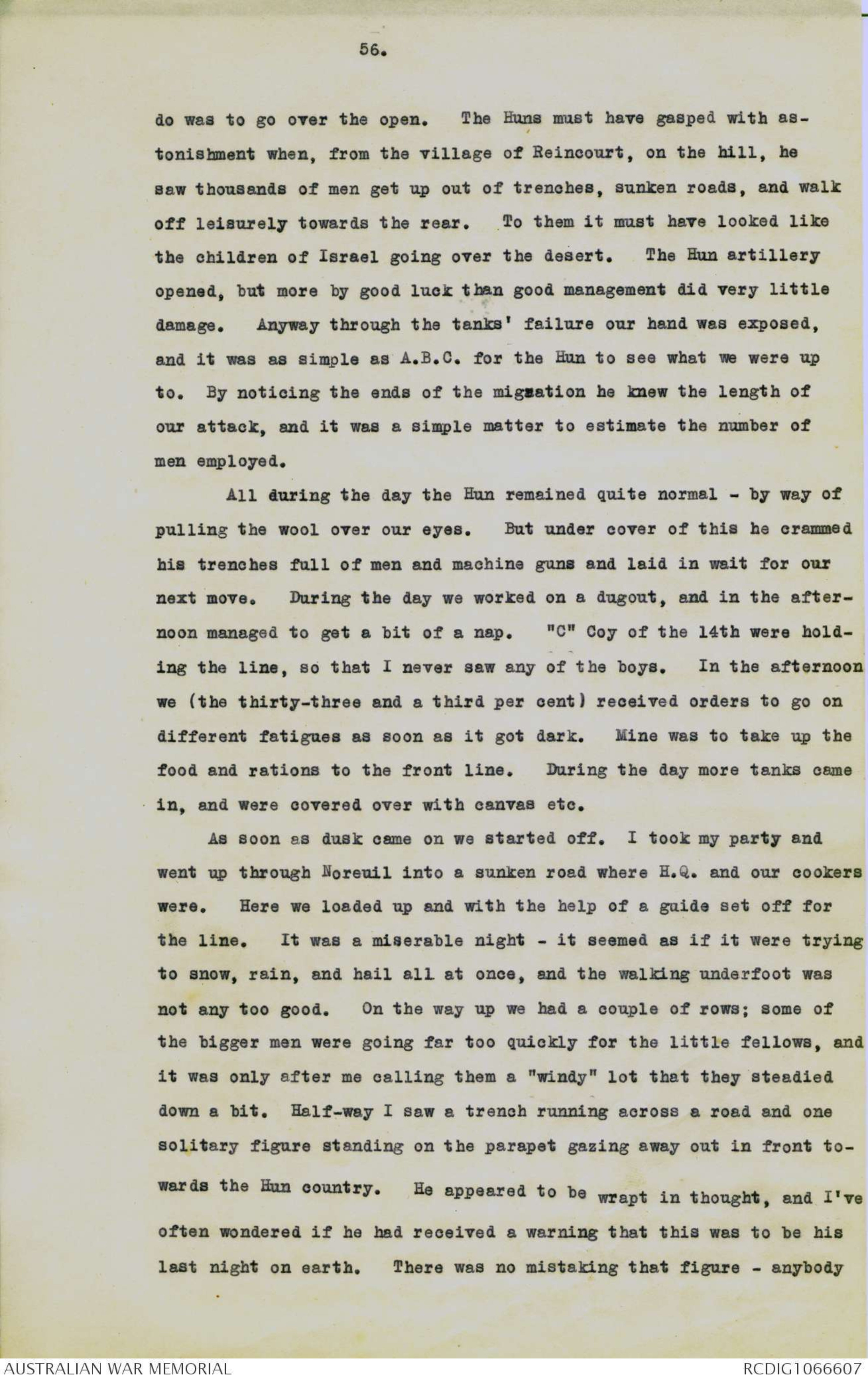
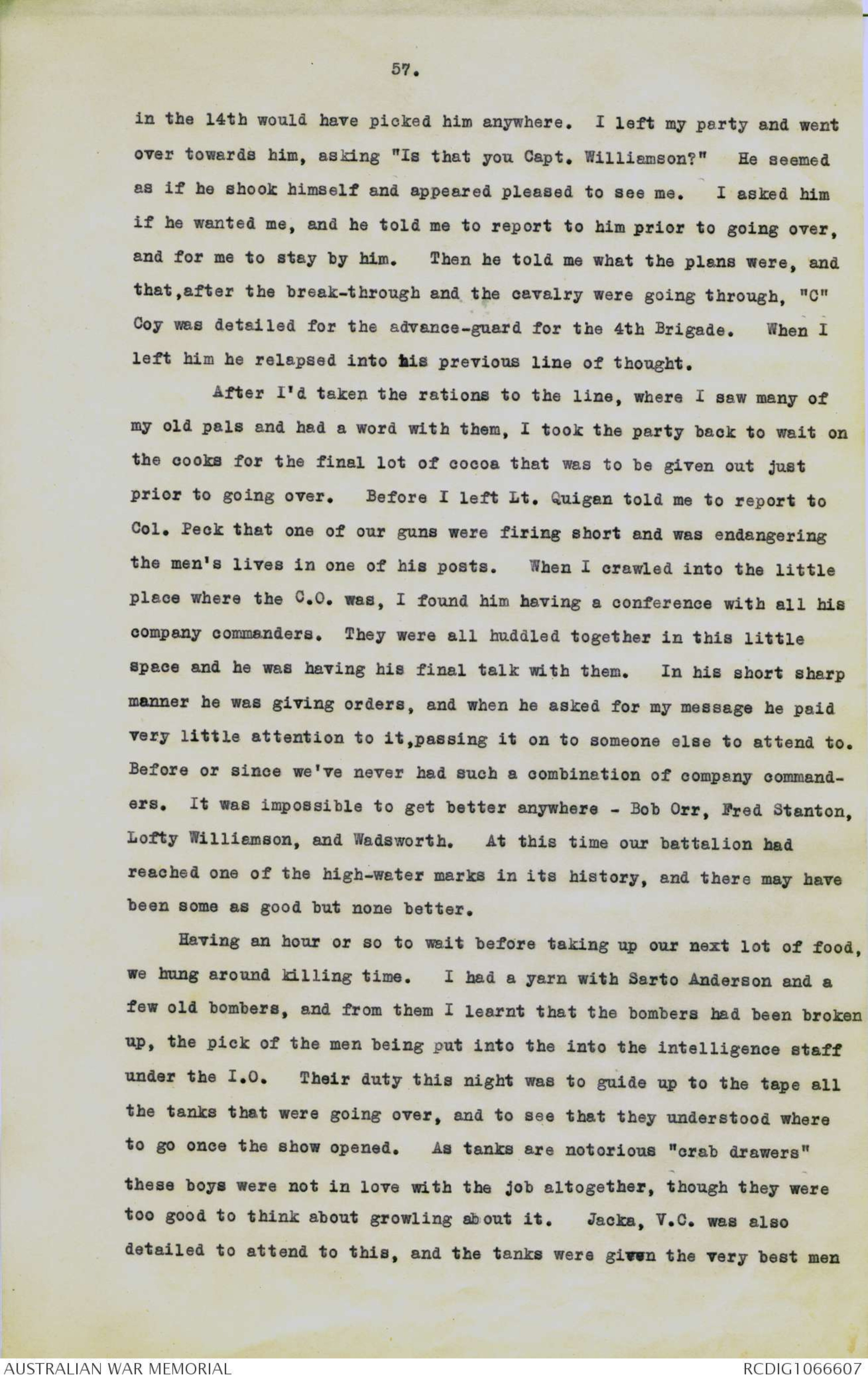
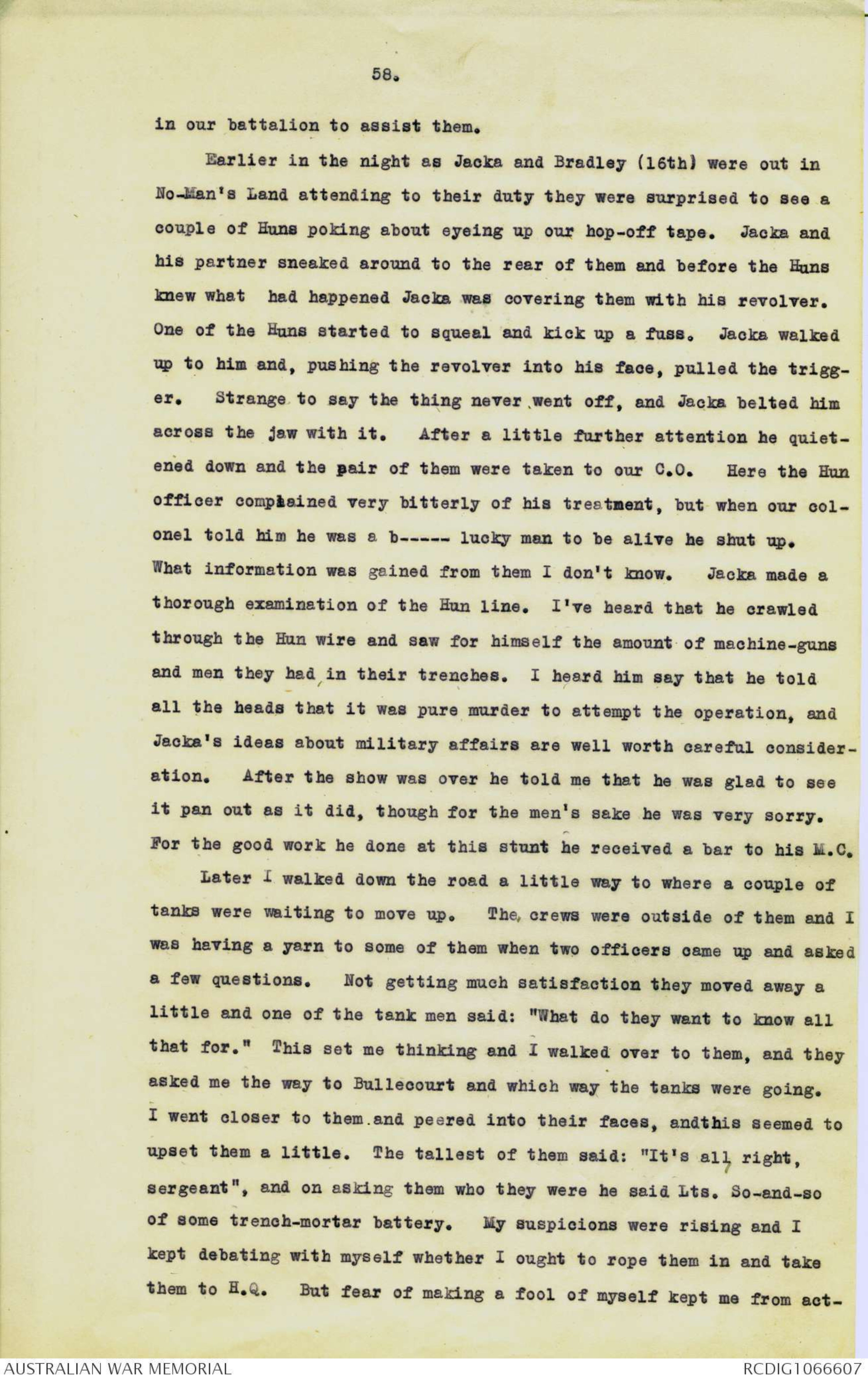
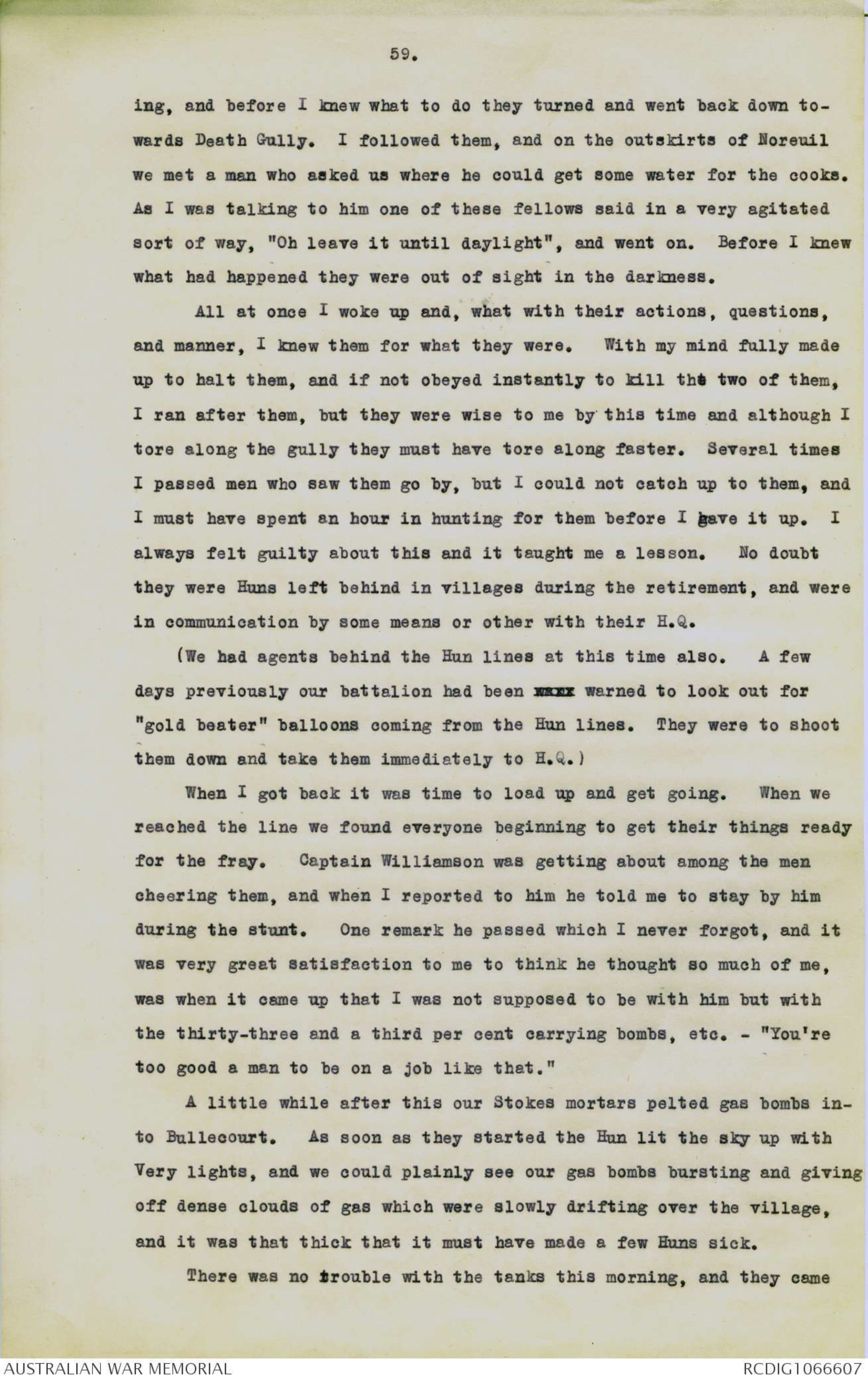
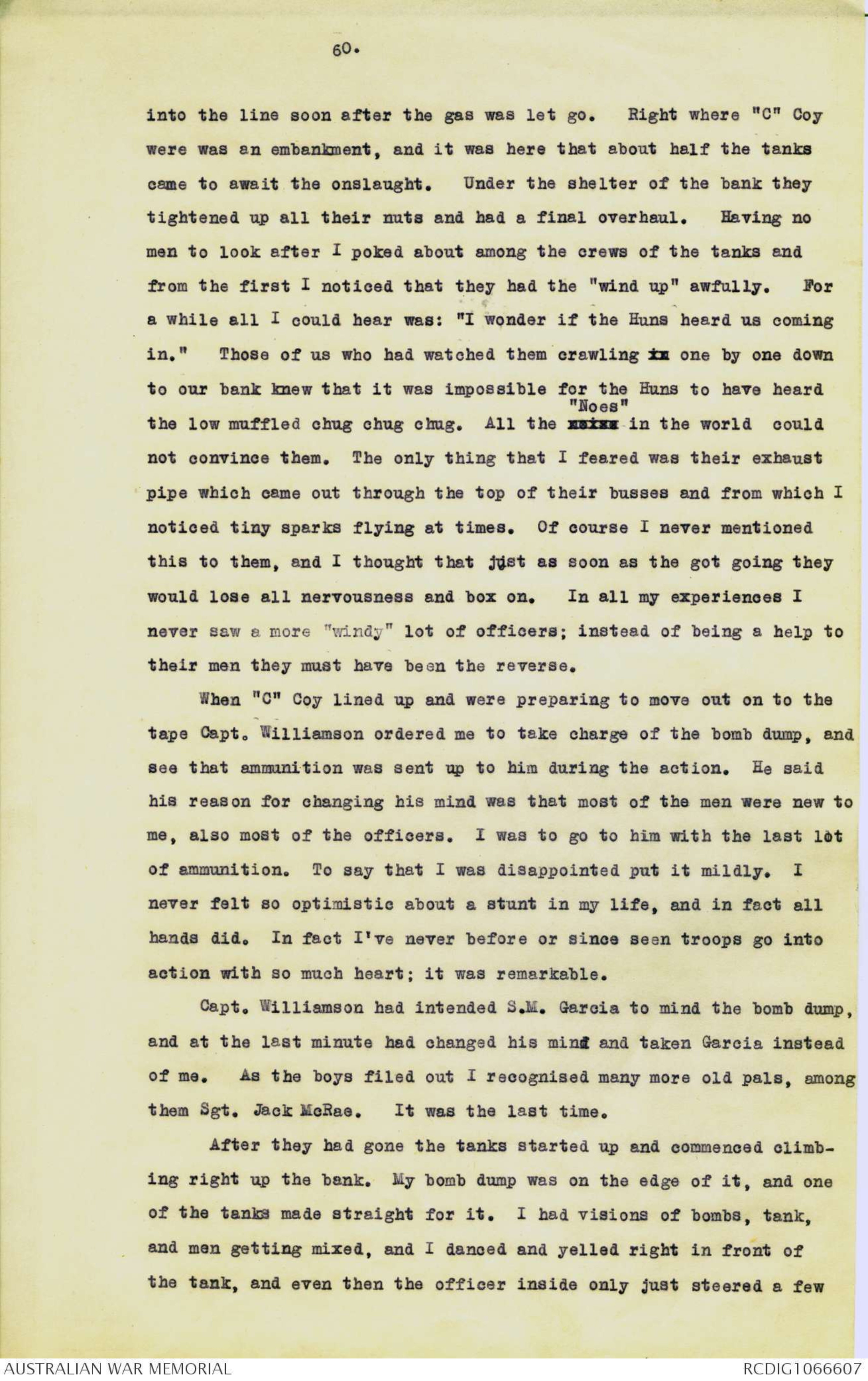
51.
stuck it out for two meals and then decided to clear out back to my
battalion for the time being until fxx rations did come. The 14th
were only a couple of miles away and I knew I'd be home and dried.
Before I went I told the boys what I was doing and practically advised
them to do the same. The consequence was all hands went away
to where they would get fed. The 16th Battalion boys saw Major Margolin
when they went home, and he came down next morning and chewed
Col. Fewtrell to pieces. Fewtrell was furious and threatened us all
with courts-martial and goodness knows what. I was the first that
came up and I was just about as furious as he was. After he heard my
version of it he drew his horns in and no more was said about it.
Our food came along also very soon after.
An officer's first duty always is the care and attention of his
men. Compared with the standard set in the 14th Bn. all these officers
were "No bon". Several times I'd seen Capt. Williamson and asked
him to get me back. The last time I saw him he told me to put in
an application and he'd see that it went through. At this time we
were living in huts in a camp just up from Quarry siding and on the
road to Bazentin. When I lodged my application old Jock Orr thought
it was because I was full up with him, and he told others that "some
bl---- people don't know when they were well off." Nothing seemed to
come of my application and I began to get fed up worse than ever.
Lofty Williamson had sent a man named Barfoot to relieve me, but
through some blunder or other they would not let me go, and they hung
on to the pair of us.
Barfoot was the black sheep of the company and Lofty was highly
delighted to get rid of him. He was the greatest gas-bag I'd come
across, and how his tongue never got tired was a mystery. Among the
sixty of my fellows there were a few that took a lot of beating, but
when Barfoot came it was days before they got a chance to say anything.
By this time they all jerried to him. To listen to him for a while
made you wonder why he never became Prime Minister of Australia.
Later on we were all shifted over to Bazentin and this settled my case.
I decided to clear out. Previous to this I'd seen the battalion
marching by on their way to the line and somehow I felt that ashamed
52.
that I walked away rather than let them see me. This was the
straw that broke the camel's back, and a few mornings after I
packed up and started off to find them.
I found out that they were encamped just behind Bapaume. I
got a lorry that was going to the town and reached them about midday.
(The last time I had been in Bapaume was about a month previously;
Jack Thomas, the waiter at the sergeants' mess (Pioneers) was with
me and I think that we were among the first that got into it. We
were out for a ramble and we passed through our front line, which
was about a mile behind the town, without anyone stopping us. A
cavalry screen was out in front of the town and a few diggers were
poking about hunting for what they could find. We roamed all over
the place, and it was a scene of desolation. Many of the houses
were smeared with tar and pitch to help them burn, and in the main
street corners were big mine craters. We had a good look at the
town hall, quite unconscious of the fact that a big mine was under
it with a clock arrangement ticking off the hours to let it go.
I think it was a week after that it went up and caught about (?)
fifty men. There were some French officials among them also. A
monument to a great French general in the square had been taken
away, and in its place a big stove pipe had been fixed pointing towards
our lines. The church was gutted - the massive walls they
could not destroy, but they blew everying everything inside the
walls down on to the floor, roof and all. The hounds of hell had
wrecked the place so thoroughly that there was hardly a place in
the town to shelter in. Most of the cellars and buildings that
were left were mostly mined, and it was only after a lot of men had
been killed that our people got wise. Later on our chiefs became
that annoyed with this sort of thing that we(officers) were told
that if any of our men were caught like it again we were to hunt
all the prisoners we caught down into a dugout and give them a dose
of their own medicine. During the great push in 1918 the Hun developed
other ideas, and he put time fuses into his shells which he
left behind him. These went off days afterwards along our roads
and caused no end of deaths. In the cemetery of Bapaume we saw
53.
things that convinced us that the Huns' line of thought was very
much different to ours. Instead of making a new burial ground for
themselves they had the cheek to go into the French cemetery and fill
up all vacant places with their dead. Not content with this they
erected a big stone monument to all those who had fallen for the
Fatherland. Right alongside of this was an old French monument
erected many years ago in memory of the French who fell in the Franco-Prussian
war. At first I wondered at it, but gradually anger took
its place. I've heard since that the French were furious and they
smashed the whole thing up and threw it out. Although the Hun must
have had his artillery well to the rear during this retreat he kept
up his fire on the station of Bapaume, and all his shells were
practically bulls-eyes. During his retreat he tore up all the rails
off the line and carted them off, besides blowing all bridges down.)
I set out for the battalion camp about 4 p.m. along with another boy
who was returning from hospital. Before we left we saw Lt. Shirtley
of the (?) 13th who told us that we were just in time for the biggest
battle that had ever been fought. This was the way he put it. He
was a bit out in his reckoning, though if he had said the biggest
butchering he'd have been right.
We went straight out along the road in the direction of Vaulx
Vraucourt, and after about an hour's good tramping we came to a lot
of tents alongside the road. Here we learnt that the whole brigade
had moved forward very recently, and these people were the 33 and a
third per cent left out. Capt. McDermott was in charge of the 14th
and on reporting to him he told me to attach myself to him for the
time being. There were four lines of tents in all, each line representing
one of the battalions in the brigade, C.Q.M.S. Clery was
at the waggon lines, and as soon as he saw me the he called me all the
silly ----- he could think of for coming back just then, in face of a
killing-off. Stunt or no stunt, I was that pleased to get back that
it never worried me at all. We spent the night in the tents, and
next day we put up some shelters to make more room. That evening
before we crawled in we received ordered to leave at 2 a.m. in the
morning for the line. The 14th were the only ones concerned - the
54.
other three battalions never called for their men. Why we were called
and not them I've never heard. At 2 a.m. we got moving along the
road and settled down to a couple of hours' steady march. All
packs (?) were being sent forward also; this looked as if we were
going to drive the Huns for miles.
The reason for all this was that in the south General Nivelle,
the French Commander-in-Chief, had attacked the Huns around the
Chemin des Dames (?), and after bitter fighting in which he captured
20,000 prisoners he came an awful crash. Things looked that black
that General Haig was asked to attack in the north to draw off the
Huns reserve troops from the French. Previous to this Vimy Ridge to
our north had been taken by the Canadians and they were settling down
to organise their captured ground (?). They were in no position to
strike and we were in the same fix, as the Hun had only just reached
his Hindenburg Line, and we were in no position to tackle such a formidable
line. Our railway was miles behind us and our artillery was
very feeble. All main roads were mined at awkward places, and it all
held up our advance. At this particular time our papers were making a
great song about our advance and the Huns' discomfiture, and they gave
people a totally false impression. True he gave up ground, but the
way he made us pay for it put him on the credit side of the account.
The present battle which was to commence on the 10th of April had
for its object - first, the breaking of the Hindenburg Line at Bullecourt
and Reincourt; secondly, the cavalry were to sweep up behind the
Hindenburg Line towards the Canadians ^(?)further north and capture all his
artillery etc. A couple of miles south of Reincourt was the town of
Queant, and it was at this place that the Hindenburg Line joined with
the (?) Seigfried Line. This line was the second line and behind the
Hindenburg Line.
Generally nearly all schemes look nice on paper, no matter how
rotten they are. This one was an exception, as far as our chiefs were
concerned. Maybe it looked all right to that glorified dud, General
Gough, whose army we were part of, but he took no notice of General
Birdwood and the rest of the Aussie generals when they implored him to
change the scheme and give the men a chance. Later, out at Mametz
55.
camp, I heard both General Birdwood, and General Brand apologise to
the men whonwere left, and with tears in their eyes tell the men how
they did everything in their power to have the thing altered, but
without success. From a man-in-the-rank's point of view I think
Gough should have been relieved of his command of the Fifth Army, and
then publicly hung and burnt. (Although he was later white-washed by
Haig over the Mxxx March 21st 1918 disaster, it was about all that
could be expected from him, and I believe that, if he had been removed
earlier and a more competent man employed, the Hun would not have met
with so much success. In saying this I'm thinking of the glaring
things that his army failed in - such as the failure to blow up
bridges, destroy dumps, etc.) Our artillery was so weak that it
could not be relied on to give much support, and to make matters even
up a little we were given about a dozen tanks. These were to advance
ahead of the infantry, crush the belts of wire flat, and the men were
to follow in their track and gain the enemy trenches without a shot
being fired on them.by the artillery. All artillery were told off to
counter-battery work.
After passing through Vaulx, where we saw a few heavy guns firing
off and on, we got on to what was once a railroad, and this led us
straight up Death Gully to Noreuil. All along the gully were scattered
a few batteries of 18-pounders. By this time it was just peeping
day, and we were surprised to see three or four tanks waddling round.
Our officer received orders to halt and wait for further orders, and
when broad daylight came men began to stream back from the front line
through Noreuil and into the gully. At the time we all had very
hazy ideas as to what was going on, but later on we found out. This
was the famous buckshee stunt of Bullecourt. The reason of it was
that the tanks, on whom so much depended, had not arrived on the tape
and the stunt had to be cancelled. The zero time was just a little
before daylight, and when it came it found the whole force in sunken
roads and bits of trenches in full view of the Hun. We were a little
too far away from him to hurt us much with small-arms fire. Later on
word came for all the attacking force to retire back to the reserve
line to await further orders. There being no C.T's the only thing to
56.
do was to go over the open. The Huns must have gasped with astonishment
when, from the village of Reincourt, on the hill, he
saw thousands of men get up out of trenches, sunken roads, and walk
off leisurely towards the rear. To them it must have looked like
the children of Israel going over the desert. The Hun artillery
opened, but more by good luck than good management did very little
damage. Anyway through the tanks' failure our hand was exposed,
and it was as simple as A.B.C. for the Hun to see what we were up
to. By noticing the ends of the migxation he knew the length of
our attack, and it was a simple matter to estimate the number of
men employed.
All during the day the Hun remained quite normal - by way of
pulling the wool over our eyes. But under cover of this he crammed
his trenches full of men and machine guns and laid in wait for our
next move. During the day we worked on a dugout, and in the afternoon
managed to get a bit of a nap. "C" Coy of the 14th were holding
the line, so that I never saw any of the boys. In the afternoon
we (the thirty-three and a third per cent) received orders to go on
different fatigues as soon as it got dark. Mine was to take up the
food and rations to the front line. During the day more tanks came
in, and were covered over with canvas etc.
As soon as dusk came on we started off. I took my party and
went up through Noreuil into a sunken road where H.Q. and our cookers
were. Here we loaded up and with the help of a guide set off for
the line. It was a miserable night - it seemed as if it were trying
to snow, rain, and hail all at once, and the walking underfoot was
not any too good. On the way up we had a couple of rows; some of
the bigger men were going far too quickly for the little fellows, and
it was only after me calling them a "windy" lot that they steadied
down a bit. Half-way I saw a trench running across a road and one
solitary figure standing on the parapet gazing away out in front towards
the Hun country. He appeared to be wrapt in thought, and I've
often wondered if he had received a warning that this was to be his
last night on earth. There was no mistaking that figure - anybody
57.
in the 14th would have picked him anywhere. I left my party and went
over towards him, asking "Is that you Capt. Williamson?" He seemed
as if he shook himself and appeared pleased to see me. I asked him
if he wanted me, and he told me to report to him prior to going over,
and for me to stay by him. Then he told me what the plans were, and
that,after the break-through and the cavalry were going through, "C"
Coy was detailed for the advance-guard for the 4th Brigade. When I
left him he relapsed into his previous line of thought.
After I'd taken the rations to the line, where I saw many of
my old pals and had a word with them, I took the party back to wait on
the cooks for the final lot of cocoa that was to be given out just
prior to going over. Before I left Lt. Quigan told me to report to
Col. Peck that one of our guns were firing short and was endangering
the men's lives in one of his posts. When I crawled into the little
place where the C.O. was, I found him having a conference with all his
company commanders. They were all huddled together in this little
space and he was having his final talk with them. In his short sharp
manner he was giving orders, and when he asked for my message he paid
very little attention to it,passing it on to someone else to attend to.
Before or since we've never had such a combination of company commanders.
It was impossible to get better anywhere - Bob Orr, Fred Stanton,
Lofty Williamson, and Wadsworth. At this time our battalion had
reached one of the high-water marks in its history, and there may have
been some as good but none better.
Having an hour or so to wait before taking up our next lot of food,
we hung around killing time. I had a yarn with Sarto Anderson and a
few old bombers, and from them I learnt that the bombers had been broken
up, the pick of the men being put into the into the intelligence staff
under the I.O. Their duty this night was to guide up to the tape all
the tanks that were going over, and to see that they understood where
to go once the show opened. As tanks are notorious "crab drawers"
these boys were not in love with the job altogether, though they were
too good to think about growling about it. Jacka, V.C. was also
detailed to attend to this, and the tanks were given the very best men
58.
in our battalion to assist them.
Earlier in the night as Jacka and Bradley (16th) were out in
No-Man's Land attending to their duty they were surprised to see a
couple of Huns poking about eyeing up our hop-off tape. Jacka and
his partner sneaked around to the rear of them and before the Huns
knew what had happened Jacka was covering them with his revolver.
One of the Huns started to squeal and kick up a fuss. Jacka walked
up to him and, pushing the revolver into his face, pulled the trigger.
Strange to say the thing never went off, and Jacka belted him
across the jaw with it. After a little further attention he quietened
down and the pair of them were taken to our C.O. Here the Hun
officer complained very bitterly of his treatment, but when our colonel
told him he was a b----- lucky man to be alive he shut up.
What information was gained from them I don't know. Jacka made a
thorough examination of the Hun line. I've heard that he crawled
through the Hun wire and saw for himself the amount of machine-guns
and men they had in their trenches. I heard him say that he told
all the heads that it was pure murder to attempt the operation, and
Jacka's ideas about military affairs are well worth careful consideration.
After the show was over he told me that he was glad to see
it pan out as it did, though for the men's sake he was very sorry.
For the good work he done at this stunt he received a bar to his M.C.
Later I walked down the road a little way to where a couple of
tanks were waiting to move up. The crews were outside of them and I
was having a yarn to some of them when two officers came up and asked
a few questions. Not getting much satisfaction they moved away a
little and one of the tank men said: "What do they want to know all
that for." This set me thinking and I walked over to them, and they
asked me the way to Bullecourt and which way the tanks were going.
I went closer to them and peered into their faces, andthis seemed to
upset them a little. The tallest of them said: "It's all right,
sergeant", and on asking them who they were he said Lts. So-and-so
of some trench-mortar battery. My suspicions were rising and I
kept debating with myself whether I ought to rope them in and take
them to H.Q. But fear of making a fool of myself kept me from acting,
59.
and before I knew what to do they turned and went back down towards
Death Gully. I followed them, and on the outskirts of Noreuil
we met a man who asked us where he could get some water for the cooks.
As I was talking to him one of these fellows said in a very agitated
sort of way, "Oh leave it until daylight", and went on. Before I knew
what had happened they were out of sight in the darkness.
All at once I woke up and, what with their actions, questions
and manner, I knew them for what they were. With my mind fully made
up to halt them, and if not obeyed instantly to kill the two of them,
I ran after them, but they were wise to me by this time and although I
tore along the gully they must have tore along faster. Several times
I passed men who saw them go by, but I could not catch up to them, and
I must have spent an hour in hunting for them before I gave it up. I
always felt guilty about this and it taught me a lesson. No doubt
they were Huns left behind in villages during the retirement, and were
in communication by some means or other with their H.Q.
(We had agents behind the Hun lines at this time also. A few
days previously our battalion had been warn warned to look out for
"gold beater" balloons coming from the Hun lines. They were to shoot
them down and take them immediately to H.Q.)
When I got back it was time to load up and get going. When we
reached the line we found everyone beginning to get their things ready
for the fray. Captain Williamson was getting about among the men
cheering them, and when I reported to him he told me to stay by him
during the stunt. One remark he passed which I never forgot, and it
was very great satisfaction to me to think he thought so much of me,
was when it came up that I was not supposed to be with him but with
the thirty-three and a third per cent carrying bombs, etc. - "You're
too good a man to be on a job like that."
A little while after this our Stokes mortars pelted gas bombs into
Bullecourt. As soon as they started the Hun lit the sky up with
Very lights, and we could plainly see our gas bombs bursting and giving
off dense clouds of gas which were slowly drifting over the village,
and it was that thick that it must have made a few Huns sick.
There was no trouble with the tanks this morning, and they came
60.
into the line soon after the gas was let go. Right where "C" Coy
were was an embankment, and it was here that about half the tanks
came to await the onslaught. Under the shelter of the bank they
tightened up all their nuts and had a final overhaul. Having no
men to look after I poked about among the crews of the tanks and
from the first I noticed that they had the "wind up" awfully. For
a while all I could hear was: "I wonder if the Huns heard us coming
in." Those of us who had watched them crawling in one by one down
to our bank knew that it was impossible for the Huns to have heard
the low muffled chug chug chug. All the noise ^"Noes" in the world could
not convince them. The only thing that I feared was their exhaust
pipe which came out through the top of their busses and from which I
noticed tiny sparks flying at times. Of course I never mentioned
this to them, and I thought that just as soon as the got going they
would lose all nervousness and box on. In all my experiences I
never saw a more "windy" lot of officers; instead of being a help to
their men they must have been the reverse.
When "C" Coy lined up and were preparing to move out on to the
tape Capt. Williamson ordered me to take charge of the bomb dump, and
see that ammunition was sent up to him during the action. He said
his reason for changing his mind was that most of the men were new to
me, also most of the officers. I was to go to him with the last lot
of ammunition. To say that I was disappointed put it mildly. I
never felt so optimistic about a stunt in my life, and in fact all
hands did. In fact I've never before or since seen troops go into
action with so much heart; it was remarkable.
Capt. Williamson had intended S.M. Garcia to mind the bomb dump
and at the last minute had changed his mind and taken Garcia instead
of me. As the boys filed out I recognised many more old pals, among
them Sgt. Jack McRae. It was the last time.
After they had gone the tanks started up and commenced climbing
right up the bank. My bomb dump was on the edge of it, and one
of the tanks made straight for it. I had visions of bombs, tank,
and men getting mixed, and I danced and yelled right in front of
the tank, and even then the officer inside only just steered a few
 Deb Parkinson
Deb ParkinsonThis transcription item is now locked to you for editing. To release the lock either Save your changes or Cancel.
This lock will be automatically released after 60 minutes of inactivity.